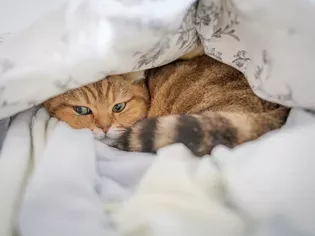Vestibular Disease in Cats
Updated on 05/27/24

Understanding Vestibular Disease in Cats: A Comprehensive Guide
Introduction
Vestibular disease in cats is a common neurological condition that affects the inner ear and balance system. It can cause a variety of symptoms, including head tilt, dizziness, nausea, and vomiting. While vestibular disease can be a serious condition, it is often treatable.
What Causes Vestibular Disease in Cats?
There are many potential causes of vestibular disease in cats, including:
* Infections: Viral or bacterial infections of the inner ear can cause inflammation and damage to the vestibular system.
* Trauma: Head trauma can damage the vestibular system directly.
* Tumors: Tumors in the inner ear or brain can also cause vestibular disease.
* Certain Medications: Some medications, such as antibiotics and anti-inflammatories, can have side effects that affect the vestibular system.
* Birth defects: Some cats are born with defects in their vestibular system.
Symptoms of Vestibular Disease in Cats:
The symptoms of vestibular disease in cats can vary depending on the severity of the condition and the underlying cause. Common symptoms include:
* Head tilt: This is the most common symptom of vestibular disease in cats. The cat may hold its head at an angle or tilt it to one side.
* Dizziness: Cats with vestibular disease may appear dizzy or unsteady on their feet. They may walk in circles or have difficulty navigating their environment.
* Nausea and vomiting: The nausea and vomiting associated with vestibular disease is caused by the imbalance in the cat's inner ear.
* Nystagmus: This is a condition in which the eyes move rapidly and involuntarily. It can be a sign of vestibular disease.
* Ataxia: This is a condition in which the cat has difficulty with coordination and balance. It can be a sign of vestibular disease.
Diagnosis of Vestibular Disease in Cats:
The diagnosis of vestibular disease in cats is based on a physical examination and a neurological examination. Your veterinarian will also likely recommend some diagnostic tests, such as:
* Blood tests: These tests can help rule out other potential causes of the symptoms, such as infections or electrolyte imbalances.
* Imaging tests: Imaging tests, such as X-rays and MRI scans, can help visualize the inner ear and brain and rule out any abnormalities.
Treatment for Vestibular Disease in Cats:
The treatment for vestibular disease in cats will depend on the underlying cause. In some cases, the condition will resolve on its own. In other cases, treatment may be necessary to manage the symptoms and improve the cat's quality of life.
Treatment options for vestibular disease in cats include:
* Medications: Medications can be used to control nausea and vomiting, reduce inflammation, or correct electrolyte imbalances.
* Surgery: In some cases, surgery may be necessary to remove a tumor or repair a damaged inner ear.
* Rehabilitation: Rehabilitation exercises can help cats regain their balance and coordination.
Prognosis for Vestibular Disease in Cats:
The prognosis for vestibular disease in cats will depend on the underlying cause and the severity of the condition. In many cases, the condition will resolve on its own within a few weeks or months. However, in some cases, the condition may be permanent.
Prevention of Vestibular Disease in Cats
There is no sure way to prevent vestibular disease in cats, but there are some things you can do to reduce the risk, including:
* Vaccinate your cat against infectious diseases: This will help protect your cat from infections that can lead to vestibular disease.
* Avoid head trauma: Keep your cat indoors and away from potential hazards, such as busy streets or other animals.
* Be aware of the side effects of medications: Talk to your veterinarian about any medications your cat is taking and be aware of the potential side effects.
* Regular veterinary check-ups: Regular veterinary check-ups can help detect any early signs of vestibular disease so that treatment can be started promptly.
Conclusion
Vestibular disease in cats is a common neurological condition that can have a significant impact on the cat's quality of life. However, with proper diagnosis and treatment, most cats can make a full recovery. If you think your cat may have vestibular disease, it is important to see your veterinarian right away.
Explore More Pets

Cat Behavior Problems
How to Stop Aggression in Kittens

Long-Haired Cat Breeds
Siberian Cat: Breed Profile, Characteristics, & Care

Cat Behavior Problems
How to Stop Kittens From Scratching and Biting

Long-Haired Cat Breeds
Turkish Angora: Cat Breed Profile, Characteristics & Care

Basic Training
How to Socialize Your Kitten

Short-Haired Cat Breeds
Cute Pictures & Facts About Calico Cats & Kittens

Litter Box Training
Training Your Kitten to Use the Litter Box

Long-Haired Cat Breeds
10 Fun Facts About White Cats
